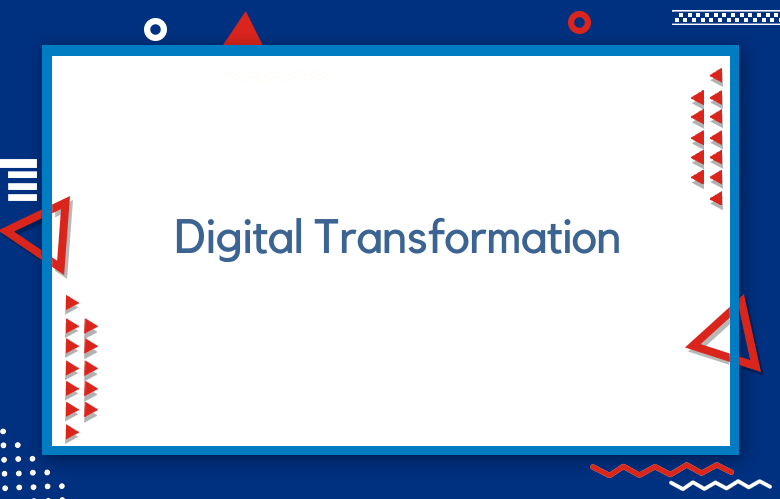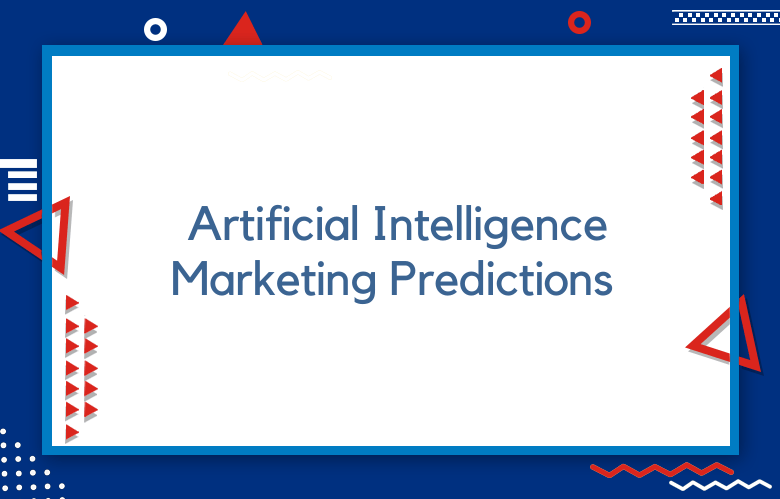What is a Digital Transformation in Marketing?

Digital Transformation in marketing is leveraging digital technologies and data to create new, more effective ways to reach customers and generate sales. It’s not just about digitizing existing processes; it’s about transforming your marketing approach to keep up with the changing times.
Digital transformation is an essential concept for businesses to understand and embrace.
It can help marketers reach new heights by creating a digital presence that can engage customers, increase efficiency, and help companies stay competitive in today’s ever-changing market.
Let’s explore digital transformation and how it can be applied to marketing to make your business stand out.
In today’s digital age, businesses must stay ahead of the competition.
To do this, businesses must use technology and the data that comes from it to alter their marketing strategies.
This process is known as a digital transformation in marketing.
A digital transformation in marketing involves recognizing customer needs, understanding customer behavior, and taking advantage of opportunities to increase sales and ROI by using digital channels.
It also involves implementing new technologies and processes to improve user experience and customer engagement.
Let’s look at how a digital transformation can help your business succeed.
What is Digital Transformation?
Digital transformation (DT) uses technology to create long-term organizational change.
It uses digital tools such as customer relationship management (CRM) systems, social media channels, data analytics, automation software, and more to improve customer experience and operational processes.
The goal of DT is to drive growth by leveraging the power of technology to meet changing customer demands and create new opportunities for engagement.
Digital transformation in marketing is using technology to expand your reach with potential customers.
This includes using mobile apps, websites, online ads, emails, and other digital platforms to engage with them.
By reaching out through these digital channels, you can connect with people who would otherwise not find or engage with your business through traditional methods such as print or radio ads.
You can also use data from past campaigns to determine which tactics work best for your business and tailor future campaigns accordingly.
You can track customer behavior more closely with analytics tools that measure website performance metrics like page views and conversions.
With this information, you can create more effective campaigns that target the right audience at the appropriate time.
Leveraging automation tools such as chatbots can free up resources so your team can focus on higher-value activities like building customer relationships or creating content strategies for future campaigns.
Automation lets you streamline processes to provide better service faster than ever— without sacrificing efficiency or quality control.
How does Digital Transformation help with Marketing?
Digital transformation has become increasingly important for marketers as customers expect more from companies they do business with.
By leveraging technologies like artificial intelligence (AI), big data, machine learning, predictive analytics, augmented reality (AR), virtual reality (VR), the Internet of Things (IoT), blockchain, natural language processing (NLP), chatbots, voice search optimization, mobile optimization and more – marketers can create more efficient campaigns that better target customers with relevant content that drives results.
DT helps marketers track customer behavior across multiple channels to gain valuable insights into customer needs, which can be used to tailor content accordingly.
Digital transformation helps marketers automate processes such as scheduling posts on social media or sending automated emails based on user interactions with content.
Automation saves time and ensures that tasks are completed quickly and accurately – reducing errors and freeing up employees for more creative tasks like strategy development or product innovation.
DT can help generate leads by providing potential customers with helpful information about products or services before they make a purchase decision – allowing companies to capture leads earlier in the sales funnel.
The main reasons companies need a Digital Transformation
Digital Transformation is using digital technologies to create new or different business processes, cultures, and customer experiences to drive value for the organization.
There are many reasons why companies need Digital Transformation. One reason is that digital technologies are disruptors.
They can quickly change how customers interact with businesses and how businesses operate. Digital Transformation allows companies to be more agile and adapt to these changes rapidly.
Digital Transformation can help companies save money and be more efficient. For example, automating processes can help reduce costs.
Digital Transformation can also help companies improve their customer experiences.
Companies can create long-term customer relationships by understanding them better and using data to personalize their experiences. In today’s competitive landscape, Digital Transformation is essential for companies that want to survive and thrive.
Companies must adapt or risk being left behind as the world becomes increasingly digitized.
A Digital Transformation is integrating digital technology into all business areas, from operations to customer relations. There are many reasons why companies need to undergo a
Digital Transformation, but three of the most important are staying competitive, improving efficiency, and attracting and retaining customers. In the current business landscape, those who fail to embrace digital technology will quickly be disadvantaged.
Digital Transformation can help companies streamline operations, improve efficiency, and reduce costs. In addition, customers increasingly expect companies to offer a seamless digital experience, and those who fail will find it challenging to attract and retain them.
Digital Transformation can also help companies unlock new revenue streams and markets. Undergoing a Digital Transformation is no small undertaking, but it is essential for companies that want to stay competitive.
Business Transformation vs. Digital Transformation
A lot of businesses nowadays are undergoing digital transformation. Digital transformation is the change associated with applying digital technology in all human society.
Businesses have realized that to stay relevant, they need to employ digital technologies like big data, cloud computing, and artificial intelligence to make their processes more efficient and customer-centric.
Digital transformation can be daunting, but businesses need to undergo it to survive in the long run.
However, some business leaders believe that digital transformation is nothing more than a buzzword.
They argue that businesses have continually been transforming, so there’s nothing new. Moreover, they say digital transformation is a fancy way of saying “business transformation.”
While it’s true that businesses have continually been transforming, the pace of change has accelerated exponentially in recent years.
Thanks to digital technologies, businesses can now gather and process data at a scale and speed that was unimaginable just years ago.
As a result, business leaders who embrace digital transformation can gain a competitive advantage over those who don’t.
Digital transformation is of digital technologies to change how an organization operates.
It goes beyond digitizing existing processes and requires a company to use technology to redesign how it does business radically.
In contrast, business transformation is a comprehensive strategy encompassing everything from organizational culture to process improvement. While digital transformation is undoubtedly a part of business transformation, it is only one piece of the puzzle.
To truly transform their businesses, companies must take a holistic approach that considers all the aspects of their operations. Only then can they hope to achieve the radical changes necessary to compete in the digital age.
What is Digital Transformation Marketing?
Digital Transformation Marketing is the application of Digital Marketing technologies and processes to improve marketing performance dramatically.
Digital Transformation Marketing leverages customer data and insight, advanced analytics, technology platforms and processes, and the power of digital communications to drive more effective marketing decisions, optimize marketing investments, and create more valuable customer relationships.
Digital Transformation Marketing is essential for organizations that want to remain competitive in today’s digital economy.
By harnessing the power of Digital Marketing, organizations can improve their marketing performance, drive growth, and create more value for their customers.
Digital Transformation Marketing is the future of marketing.
Digital transformation marketing uses digital technologies to create new or improved marketing campaigns and strategies.
It involves the application of digital tools and processes to traditional marketing activities, intending to improve customer experience, engagement, and conversion rates.
Digital transformation marketing can improve online visibility, increase website traffic, and generate more leads.
It can also create more personalized and targeted marketing messages, optimize marketing spending, and measure marketing performance more effectively.
Digital transformation marketing can help businesses drive better results from their marketing efforts.
The Digital Transformation of B2B Marketing
Digital transformation is inevitable. It has already disrupted every aspect of our lives, from consuming content to shopping for groceries. And now, it is poised to upend the world of B2B marketing.
Traditionally, B2B marketing has been a slow and steady game. Companies used tried-and-true methods like print ads, direct mail, and trade shows to reach their target audiences.
But with the arrival of the internet and social media, that is all starting to change.
Many companies are turning to digital channels to reach their target audiences.
They are investing in SEO and SEM to ensure their website appears at the top of search results.
They use social media platforms like LinkedIn and Twitter to connect with potential customers and partners.
They are also leveraging data analytics tools to gain insights into customer behavior.
Several factors are driving this shift towards digital:
- Buyers are increasingly doing their research online before making purchasing decisions.
- Technology has made it easy for companies to track leads and measure ROI from digital campaigns.
- As budgets have tightened, marketers have been forced to reevaluate traditional methods that are less effective than they once were.
The digital transformation of B2B marketing is well underway. And those companies that embrace it will be well-positioned for success in future years.
Digital transformation is becoming a primary focus for businesses across industries as they strive to keep up with the ever-changing landscape of the digital world.
For B2B marketers, this means not only adapting their strategies to include new digital channels and technologies but also redefining what it means to be a B2B marketer.
The digital transformation of B2B marketing is resulting in a shift from traditional outbound tactics to modern inbound approaches.
It’s also causing marketers to reevaluate how they measure success, as leads are no longer generated solely through face-to-face interactions or print advertisements.
With so much change happening so quickly, it can take time for B2B marketers to keep up.
However, those who embrace digital transformation will be well-positioned to succeed in the new landscape.
Digital Transformation in B2C Marketing
Digital Transformation Marketing, or DXM, uses digital technologies to create new — or modify existing — business processes, culture, and customer experiences to meet changing business and market requirements.
It’s also a company-wide strategy to embrace digital change in all aspects of the business. DXM covers a wide range of activities, from Customer Relationship Management (CRM) and Social Media Marketing (SMM) to Big Data Analytics (BDA) and the Internet of Things (IoT).
Regarding DXM, B2C companies have quickly adopted new technologies and changed their marketing strategies. It is because they understand that the customer is central to Digital Transformation.
Digital customers are more connected, informed, and demanding than ever before.
As a result, B2C companies must be agile and responsive to meet their needs.
To keep up with the pace of change, B2C marketers must constantly adapt their strategies.
This means being open to new ideas, trying new things, and constantly learning. It also means being willing to fail — and learning from those failures.
The good news is that plenty of resources are available to help B2C marketers navigate the Digital Transformation landscape.
From online courses to conferences and networking events, there are plenty of opportunities to learn about the latest trends and best practices.
Digital Transformation is an ongoing journey, and B2C marketers who stay ahead of the curve will be well-positioned for success.
Digital transformation is forcing businesses to rethink how they interact with their customers.
In the past, focused marketing on pushing out information about products and services through channels like TV, radio, and print ads.
However, technology has changed the way consumers get their information.
Now, people are using search engines, social media, and online reviews to research products and make purchase decisions. As a result, businesses must adapt their marketing strategies to meet these changing needs.
Digital transformation marketing uses digital channels to connect with customers and build relationships. This may include creating targeted content, developing an SEO strategy, or investing in social media marketing.
By investing in digital transformation marketing, businesses can ensure that they are meeting the needs of modern consumers.
Digital Transformation in B2G Marketing
Organizations are under pressure, like never before, to digitally transform to keep up with the competition.
This pressure is especially acute in business-to-government (B2G) marketing. After all, government organizations are typically large and complex, with many different stakeholders to consider.
Digital transformation in B2G marketing means implementing new technologies and processes to engage citizens and customers better. It can be a challenge, but the rewards can be significant.
A successful digital transformation can increase efficiency, effectiveness, and customer satisfaction. It can also help government organizations keep up with the ever-changing technology and marketing landscape.
If your organization wants to transform its B2G marketing operations digitally, there are a few key things to remember.
You need to have a clear understanding of your goals and objectives. What do you hope to achieve through digital transformation?
Once you have a good sense of your overall goals, you can start to develop a plan for how to achieve them. This plan should take into account the specific needs of your organization, as well as the resources you have available.
It would help to consider which technologies and processes will best help you achieve your goals. There is no one-size-fits-all solution to digital transformation; what works for one organization may not work for another.
However, some general principles can guide you in deciding which technologies to implement.
These include choosing technologies that will help you simplify complex processes, improve communication and collaboration among team members, and provide customers with a more personalized experience.
It would help if you thought about how you will measure success. Digital transformation can be a long and complex process, so it’s essential to set realistic goals and benchmarks that you can use to track progress. Keeping these things in mind can increase your chances of success as you embark on your digital transformation journey.
Digital Transformation Marketing (DTM) uses digital technologies to create new or improved marketing processes and capabilities.
Unlike conventional Digital Marketing, which is focused on tactics, DTM concentrates on Strategy first.
It aims to deliver business objectives by re-engineering marketing practices to exploit new digital opportunities.
In the Business-to-Government (B2G) context, DTM can help government organizations keep pace with the ever-changing digital landscape and better engage with constituents.
By leveraging digital tools and platforms, B2G marketers can reach a wider audience more efficiently and connect with citizens on a deeper level.
For example, DTM can create more personalized and targeted communications and automated processes such as lead nurturing.
DTM can help organizations track progress and ROI more effectively, allowing real-time data-driven decision-making.
Digital Transformation Marketing can help B2G marketers drive better citizen engagement and experiences.
Digital Transformation in B2C Marketing
Customers today are more connected and informed than ever before. They can access a wealth of information and easily connect with companies and brands through social media and online channels.
As a result, businesses need to adapt their marketing strategies to meet the needs of these digital customers. This process is known as digital transformation.
Digital transformation in marketing involves using data and technology to create more personalized, relevant, and engaging customer experiences.
It also requires a shift from traditional mass-marketing tactics to a more targeted and individualized approach. By implementing a digital transformation strategy, businesses can stay ahead of the competition and better meet the needs of their digital customers.
Digital transformation marketing is the wave of the future. It is “the application of digital technology to enable a business transformation.”
In other words, it uses technology to improve customer experience and business efficiency.
There are several ways that Digital Transformation Marketing can be used to create a better customer experience.
One way is by transforming the way customers interact with the brand.
For example, suppose a company wants to provide more personalized service.
In that case, they can use Digital Transformation Marketing to create a system that captures customer data and then provides targeted content based on that data.
Another way Digital Transformation Marketing can improve customer experience is through automated marketing processes.
For instance, if a company wants to send out more timely and relevant communications, it can use Digital Transformation Marketing to create an automated system.
Automated systems can also track customer behavior and preferences to understand their needs better.
Digital Transformation Marketing can also be used to improve business efficiency.
For example, suppose a company wants to streamline its order fulfillment process.
In that case, they can use Digital Transformation Marketing to create an automated system that handles all of the steps from start to finish. This system can also track inventory levels and reorder products to keep things running smoothly.
Digital Transformation Marketing can be used to create self-service portals for customers. It allows them to access information or purchase without speaking with a representative.
Overall, Digital Transformation Marketing is a powerful tool that can be used in many ways to improve customer experience and business efficiency.
As the world continues to become more digitized, companies must find ways to stay ahead of the curve and keep up with the competition. Digital Transformation Marketing is one way they can do just that.
Digital Transformation Marketing Success Stories
Digital Transformation Marketing (DTM) success stories are becoming increasingly common as businesses strive to keep up with the ever-changing digital landscape.
DTM is using digital technologies to create a more customer-centric marketing approach.
Businesses can personalize the customer experience by utilizing data and analytics and create a seamless journey from awareness to purchase.
DTM can help businesses save time and money by automating marketing tasks and eliminating manual processes. Companies embracing DTM will be well-positioned for success as the world becomes increasingly digitized.
While every business’ DTM journey is unique, there are some common success factors that all organizations should strive for:
- It’s essential to have buy-in from senior leadership to ensure that the necessary resources are allocated to support the initiative.
- It’s crucial to develop a robust data foundation to inform marketing decisions.
- Partnering with experienced technology providers who can offer guidance and expertise throughout the transformation process is essential.
Businesses can increase their chances of achieving DTM success by focusing on these critical areas.
Several companies have already realized the benefits of DTM and are reaping the rewards.
For example, Coca-Cola used DTM to enhance its customer loyalty program, increasing customer engagement and spending.
Similarly, L’Oréal created a personalized beauty experience for its customers through DTM, increasing sales and brand loyalty.
These are just a few examples of how Digital Transformation Marketing can help businesses achieve their goals. As the competitive landscape evolves, those who embrace DTM will be well-positioned for long-term success.
Digital transformation is a hot topic in the business world today. Companies are looking for ways to use technology to gain a competitive edge and improve their bottom line.
For many companies, this means investing in digital marketing. Digital marketing can be very effective, but it can also be costly.
Companies must carefully select the right technology and partners to get the most bang. Luckily, there are plenty of success stories out there to learn from.
One company that has seen great success with digital marketing is Coca-Cola. The soda giant has used digital marketing techniques for years to reach its massive customer base.
In 2013, it invested $30 million in Digital 6, a digital marketing agency. This investment paid off big time, as Digital 6 helped Coke launch successful campaigns that increased its brand awareness and sales.
Another company that has had success with digital marketing is Nike.
Nike is one of the most innovative technology companies, and it has used this to its advantage with its marketing efforts.
In 2016, it launched the Nike+ app, which allows users to track their activity and purchase Nike products.
The app was a huge hit and has helped Nike connect with its customers in a new and meaningful way.
Digital marketing can be an excellent way for companies to reach new customers and boost sales.
However, selecting the right technology and partners is essential to ensure success. Luckily, there are plenty of digital transformation marketing success stories to learn from.
Understanding Digital Transformation in Marketing
Digital transformation in marketing involves a shift from traditional, analog marketing tactics to a more automated and data-driven approach.
This means utilizing tools like automation software and leveraging data analytics to get better insights into your customers’ behavior and needs.
Digital transformation also involves creating new customer experiences through interactive content, personalized offers, and other innovative strategies.
Analytics-Driven Insights
The data collected from your customers allows you to identify patterns and trends in their behavior and preferences.
By analyzing data points such as demographics, location, purchase history, website visits, etc., you can gain insights into your target audience to help shape your future marketing strategies.
For example, suppose you find that most of your customers are in a particular region or demographic group. In that case, you can adjust your messaging to resonate more with those groups.
Enhanced Customer Experience
The key to successful marketing is providing an exceptional customer experience across all platforms—via email campaigns or social media posts.
Leveraging advanced technologies such as artificial intelligence (AI) and machine learning can help you personalize messages for each customer based on their past interactions with your brand or products.
AI-based chatbots can provide personalized assistance for customers who have questions about products or services, making them feel valued by the company and increasing their loyalty towards the brand over time.
You can also use analytics tools like Google Analytics or Adobe Analytics to track customer journeys across different devices to understand how they interact with your website or mobile app so that you can create better experiences for them in the long run.
Benefits of Digital Transformation in Marketing
Digital transformation presents many opportunities for businesses to improve their marketing efforts.
By leveraging digital technologies and data-driven approaches, businesses can increase their reach, boost customer engagement, promote revenue growth, reduce costs, and gain better insights into customer behavior.
Digital transformation helps businesses stay competitive by enabling them to adjust their strategies based on what works best for their current market conditions.
Conclusion
digital transformation in marketing is an essential tool for businesses looking to stay competitive and maximize their potential for success.
By leveraging digital technologies and data-driven approaches, businesses can create new customer experiences that will help them stay ahead of the competition while driving growth and boosting revenue at the same time.
Any business can use these powerful tools with the right Strategy and succeed in today’s fast-paced digital landscape.
A digital transformation is integrating digital technology into all business areas, resulting in fundamental changes to how companies operate and deliver value to customers.
It’s also a cultural change that requires organizations to rethink how they market, sell, service, and deliver their products and services.
If you want to help drive your company’s marketing strategy forward through a digital transformation, we can help.
Our team of experts has years of experience helping companies large and small successfully navigate these waters. Call us today to learn more about our Digital Transformation in Marketing Consulting services.
Call: +91 9848321284
Email: [email protected]



